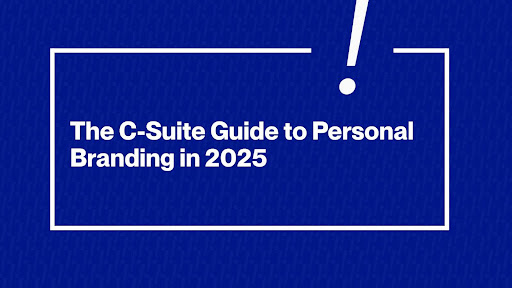
The C-Suite Guide to Personal Branding in 2026
In 2025, a C-suite leader’s personal brand is more than a LinkedIn profile update; it’s a strategic asset. As a CEO, COO, or CMO, building authority in your industry boosts trust that translates into real opportunities for your business and career. Below, we break down why authority equals opportunity, how to position yourself as a thought leader, and the new social media playbook for executives. (Plus, don’t miss the Executive Brand Audit Template at the end!)
Why Authority Equals Opportunity
Authority isn’t about ego; it’s about trust and credibility, which open doors. Studies show 82% of consumers trust a company more when its senior executives are active online, and 77% are more likely to buy from a business whose CEO engages on social media. In other words, when you show up as a knowledgeable, authentic leader, people respond with confidence. This trust can lead to new clients, partnerships, and career opportunities.
Personal branding is often called a “trust accelerator” for this reason. Being recognized as an industry authority means your voice carries weight, making others more likely to invite you into important conversations and deals. Simply put: if you’re invisible, you’re missing out, but if you’re credible and visible, opportunity knocks.
Positioning Yourself as a Thought Leader
Becoming a thought leader requires strategy and consistency. Here’s how to position your CEO’s personal brand for industry influence:
- Identify Your Unique Value Proposition (UVP): Pinpoint what makes you stand out as a leader, the blend of skills, experience, and values only you offer. This clarity will shape your messaging and focus.
- Share Valuable Insights Regularly: Content creation is the cornerstone of executive branding. Publish articles, white papers or LinkedIn posts that showcase your expertise and tackle industry challenges. High-quality, insightful content positions you as a forward-thinking leader and sparks engagement.
- Engage and Network: Don’t just broadcast, converse. Speak at industry events, join panels, and participate in online discussions. Cultivate genuine relationships with peers and mentees. By mentoring others and interacting with your audience, you build goodwill and a community around your leadership. Thought leaders listen and learn, not just talk.
Consistent thought leadership will cement your authority. Over time, your name becomes synonymous with insight in your niche, attracting invitations to speak, contribute to publications, or advise on big projects. It’s about contributing to the conversation in your industry until you’re the one leading it.
Social Media for Execs: A New Playbook
Social media has become non-negotiable for today’s executives. By 2025, being a “social CEO” is practically expected, about 70% of Fortune 500 CEOs are active on at least one platform, and nearly all of them use LinkedIn. Why? Because a leader’s post often gets far more engagement than the same message from a corporate account (people prefer a face over a logo). An active social presence humanizes your company and amplifies your reach. Companies with socially active leadership see significantly more sales opportunities and engagement online.
The new playbook for execs on social media is about authenticity and strategic focus. Choose platforms that matter in your industry (LinkedIn is the flagship for B2B networking, though X (formerly Twitter) or even Instagram can play a role). Share a mix of content: industry insights, company vision, and a bit of personal perspective.
Remember, audiences today prefer “raw and real” over perfectly polished PR, and showing humility or humor can make your brand more approachable. Encourage two-way engagement by responding to comments and engaging with others’ posts; this isn’t a one-sided broadcast, it’s a dialogue.
Importantly, maintain a consistent voice and message that aligns with your values (and your company’s). If you’re too busy to post regularly, consider delegating support or working with an executive branding agency for content creation and strategy.
Many agencies specialize in CEO personal branding and can help ghostwrite posts or manage your online presence. Just ensure your authentic voice and vision guide the content. When done right, your social media presence will reinforce your thought leadership, boost trust, and even drive tangible results (from recruiting talent to attracting new business leads).
Download the Executive Brand Audit Template
Ready to elevate your personal brand? Download the Executive Brand Audit Template to assess your current online presence and identify gaps. It’s a practical step to start refining your executive brand and building the authority that leads to opportunity. Good luck on your personal branding journey!
Here are the download links for the guides:

